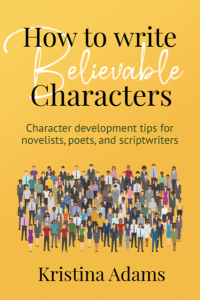by Kristina Adams , @writingcookbook
We all want characters with lots of depth, right? Characters our readers love so much they keep coming back for more?
For me, there’s no bigger compliment than when a reader says that my characters feel real to them and they want to spend more time with the people I’ve created.
One of the most important techniques in my character creation arsenal is an understanding of psychology. It’s something I’ve always been fascinated by. Why do people do what they do? Why do they feel the way they feel?
And, most of all, are they even aware of any of it?
Truth is, most people don’t know themselves as well as they like to think.
A prime example is when someone says they have empathy, then responds by telling you how they feel in a situation, not how you feel. That’s projection, not empathy. They’re confused pretty regularly.
If someone confuses projection and empathy, it shows they’re out of tune with themselves and other people. It takes a serious level of self-awareness to notice when you’re projecting, and even more to stop yourself from doing it.
But I’m getting ahead of myself. How do these things help you add more depth to your characters?
Self-awareness
Self-awareness is a really important – but less considered – step toward writing better characters.
I wrote recently about how self-awareness makes you a better writer, but let’s look at it from a character point of view for a minute.
If you understand your behavior – the good and the bad of it – you can view it objectively.
Not only does this allow you to heal from negative experiences more easily, but it also means you can analyze what you’ve been through, too.
It’s this analysis that allows you to understand how your past shapes you, and how you could use your experiences to shape your characters.
Because you’ve been through an experience yourself, the situations your characters find themselves in will be more real, since you already understand exactly what it feels like to be there.
To achieve all of this, though, it’s time for:
Studying psychology
Studying psychology can sometimes be horrifying because of what it reveals about yourself, but it’s also a great way to add depth to your characters. That’s because it teaches you the significance of cause and effect.
When someone is growing up, most situations are new to them. Those situations will therefore shape who they are, and how they feel about related situations in the future.
For instance, a child who grew up worrying about a parent picking arguments with them is more likely to be observant later in life, but may also be highly anxious.
Three-dimensional characters are defined by their past, just like we are (even if we loathe to admit it).
You don’t need to know your characters’ life histories to start writing, but knowing at least something about their past will mean you can bring it out at key moments. This will then make what your characters go through more believable and realistic.
Facing your demons
When you suppress one part of yourself, you suppress the rest unintentionally, too. You can’t feel the good emotions without fully feeling the bad. That means your characters can’t either.
You’ve buried things for a reason. Facing them is terrifying. I get that.
But what’s more important to you?
Suppressing something which can’t hurt you anymore, or helping other people face their own demons through the honesty in your writing?
Fiction can be just as therapeutic as nonfiction to read.
I recently read Queenie by Candice Carty-Williams, and the mental health journey she went on really helped me to deal with some of my own issues.
But, as it was done in a fictional environment, it felt like a safer space to confront those issues.
While I hadn’t intended to face them when reading the book, I appreciated the journey I went on with Queenie, and that book will always be important to me for that reason.
As writers, we have a responsibility to accurately represent what mental health conditions are really like. We can’t do that if we haven’t dealt with our own.
Reading about mental health conditions also helps us to explore the language that can be used to explain it in our own writing, helping to make it more accurate and believable. And helping us claw our way out from our own relapses in the future.
Doing expressive writing
I can’t rave about expressive writing enough. It’s helped me through so much.
Expressive writing is like free writing on steroids. You pick a person, event, or situation that you’ve been bottling up, or which troubles you, and write about how it makes you feel.
Not what happened – we’re not documenting it here – but how it makes you feel. It’s amazing how much we suppress our emotions without even realizing it.
At the end of an expressive writing session, you destroy what you’ve written. If you’re on a device, that could mean closing the window without saving anything. If you’ve handwritten it, you could rip it up or set it on fire (somewhere safe!).
Writing something that isn’t meant to be read – and that never will be – is very freeing. It gives us a lot more freedom to explore those things we wouldn’t usually say, and sometimes don’t allow ourselves to think.
Understanding emotions
By facing those negative emotions we bottle up, whether that’s anger, fear, or something else, we can translate our understanding of those emotions – what they look like and feel like for us – in a more real way than if we were just writing what we think something should look or feel like. This adds more depth to our characters, makes them more memorable to readers, and, for many of us, becomes the foundation of our writing careers.
Building real connections with characters isn’t about your book’s genre. Sure, that might be what lures people in. But it’s emotions that create real connections.
And emotions don’t change.
They’re universal, even if your story is set in 2133 on a spaceship. Even if you’re writing about a centaur on another plane.
Love, hate, grief, anger, lust, desire – we all feel them.
And we all deal with them differently.
But until we explore those emotions fully, we’ll never be able to give our characters as much depth as we long to.
Conclusion
Getting to know yourself allows you to really understand people and their motivations. It gives you a deeper grasp of language, as well as how certain emotions – that we often bottle up subconsciously – feel. It’s unlocking these suppressed emotions that are key to getting to know yourself and adding more depth to your characters.
Whatever genre you write, the emotions characters feel are universal. These are the key to creating memorable characters that stay with your readers long after they’ve finished your story.

Kristina Adams is the author of twelve books and too many blog posts to count. She helps writers overcome their creative obstacles on her blog, podcast, and courses, over at The Writer’s Cookbook. When she’s not writing, she’s inflicting cooking experiments on her boyfriend or playing with her dog, Millie.
5 Ways to Add Depth to Your Characters by @WritingCookbook : Share on X
Photo by Caroline Veronez on Unsplash


Easier to face in a fictional setting – that is exactly it. That’s why I’ve always enjoyed reading fantasy and science fiction. I could deal with real emotions and situations in a safe environment, one where I could handle it.
I’ve never really thought about it that way, but that’s so true. Reading and writing can be labs and offer catharsis for us.
Thanks for this, Kristina! Self-awareness is always something I need to work on and it’s great to think of it as a way of helping to develop our characters in the process. 😀
You make some strong points here! The better we understand what makes us ‘tick’ (and how other people do), the better we can create characters who are realistic. And that means they’re more likely to resonate with readers. Thanks for the ‘food for thought.’
Thanks for the great tips on how knowing ourselves better can help our writing.
Thanks for coming by, Natalie!
These are excellent tips for really getting into writing deep, realistic, and relatable characters!
I think so, too! Hope you have a great week, Tyrean!
I love it when authors I’ve followed for years (Elizabeth) cross paths with authors I’ve just started following (Kristina). Makes me feel like I’ve done something right.
Excellent! Kristina is a great resource for writers. Hope you’re doing well, Bill!
Great tips, Kristina. I love stories where I feel like I know the character (or at least they remind me of people I do know). When a character has depth, it makes me what to read more stories with them involved. Best of luck to you and your writing.
Those are my favorite kinds of stories, too!
I have always used my social work training in character building. Our attitude and history make us all unique and I’ve always wanted to give my characters that depth also.
Your social work background must be really helpful with character development!
Hi Elizabeth and Kristina – these are certainly wise words … and we shouldn’t be afraid to use our own life experiences and feelings in the characters we develop … I can see that. Thanks for this post and the links … an interesting read – all the best – Hilary
Thanks so much for coming by, Hilary!